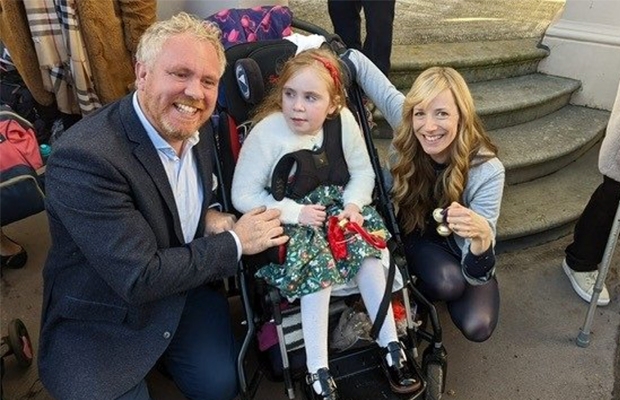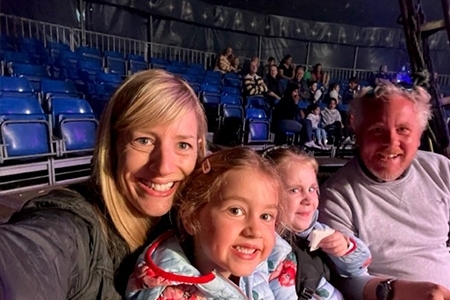When Edith suffered her seizure, she was riding her bike. Sarah explained the sudden and devastating effect this had on Edith and the whole family:
‘She went from being a child who was able to ride her bike, running around with her sister and friends, doing all the things that a normal five-year-old should be doing, to suddenly, losing all her skills in the blink of an eye. It was really quick, and it was devastating.’
Since diagnosis, Edith’s condition has affected her brain stem which controls the breathing centre and heart. Sarah and Jeff have subsequently been trained to perform resuscitation methods at home and have had occasions where she has had to perform CPR on Edith.
Another major change for the whole family since Edith’s diagnosis has been the amount of time they now spend in hospital. Edith has had long stays up to four weeks where they have had to do bursts of physiotherapy, or when she has had chest infections or pneumonia. This can be extremely hard, Sarah says:
‘You never quite know what a day is going to present itself with, and you live on the edge. When Edith had her seizure, I completely gave up work because it just become impossible to do the juggling of being in hospital more often than I was able to be at work. And we knew this wasn’t going to be something short term. I gave up my career so I could care for her full time.’
Everything the family now does has to be meticulously planned and thought out in advance. Sarah must assess the risks of day-to-day activities, ensuring wherever they go they always have an escape plan to the nearest hospital, or good phone signal in case they need to call 999. They also must make sure everywhere they go is accessible, not only so Edith’s wheelchair can be used, but also as Sarah must carry Edith’s extensive medical kit which includes an oxygen tank, suction machine, and emergency medication.
‘We’ve gone from being able to jump in the car and explore, to having to plan everything very meticulously. If we ever go anywhere, we must think about where the nearest hospital is. What’s our nearest exit plan. There have been times when I’ve had to resuscitate Edith in a supermarket, and I’ve had to rely on members of the public to hold Bea’s hand. It’s a life that's quite restrictive. The reality is we are living by medicine schedule and feed schedule and hospital appointments.’
Despite the difficulty, Sarah is determined to get the girls out and enjoy doing new things together:
‘It doesn’t make life easy. But I’m determined to get out. We still want to do so many things with her and the girls, and we want to make sure they have a rich and varied life, and lots of amazing experiences. I’m very lucky that I can rope in people to come with me places.’
Sarah also explained how isolating it can often be to have a child with a serious illness:
‘I’ve been very lucky that I have a great support network of people that I can call upon. But it is isolating in the sense that you don’t know anyone in the same situation as you. That’s hard. Nobody really understands what it’s really like. Showing people how to help is important and knowing that there are people I can lean on to make the everyday parts of life easier is vital.’
‘One of the most isolating things is when you’re in hospital. You are on your own with your child 24/7, seeing doctors and dealing with everything that they say and all the perspectives. Having to make decisions on your own is really tough. We’ve been dealing with all this through COVID times when nobody could get into the hospital or come and visit, Jeff wasn't able to come in and Bea wasn't able to spend time with her sister or I, that was very isolating and incredibly sad at times.’
Sarah got in touch with Rainbow Trust when Edith’s sister, Bea, started having a hard time dealing with her emotions. Family Support Worker, Sammii, has been supporting the family since October 2022. Sammii provides sibling support for Bea and visits her at home. This helps Bea view Sammii as a trusted adult to be around, but also someone that she can have fun with.
‘What Bea really needed during that time was lots of clear boundaries and expectations and a good routine. We were always in and out of hospital all the time. When friends looked after her, they would give her loads of one-on-one time and then when I came out of hospital, it then came back to that juggle of having to share mummy. Although it’s so lovely that people would help; it wasn’t always the most helpful for Bea. She was only three and has big emotions like any other child her age.’
Sammii also helps Sarah take both girls out and to have fun as a family:
‘When Sammii is here it makes things a lot easier, logistically, to get out of the house. It also makes it fun because she always brings a lot of energy and fun and she’s a fresh new person. Also, for me, if I’ve got any concerns, I can have a little chat with her. I don’t need to explain or apologise for Bea if she’s displaying any negative behaviour – she just accepts it for what it is, and that’s really nice. it doesn’t matter if it’s a mess, it doesn’t matter if it’s a bit crazy or we have to change plans last minute due to Edith's condition – Sammi always says she’s just here to help. It is lovely.’
Sarah’s advice for families with a seriously ill child who are thinking about reaching out for support would be:
‘Get in touch and be brave, its really hard because by making that phone call you’re admitting that you’re at a point where you’re really struggling. And admitting that there’s something not quite working for you as a family and that you need help. And that can be really difficult. But be brave. Because things can only get better. Nothing can get as bad as it is at that moment, things can only improve. Rainbow trust have such a wealth of experience helping families in lots of different ways that there’ll be something there for everyone. And everyone can benefit in some way, be that big or small – it’s definitely worth doing. ‘
Please donate today to help us support more families like Edith's.


